This Op-Ed Can Get Us Arrested in the Philippines
11 minute readWe don’t have to imagine what it’s like to live in a country where local governments more readily support their police department’s access to military grade weapons than their own citizens’ access to health care and other basic needs. We’ve already seen it here.
The COVID-19 pandemic has exposed government prioritization of state terror during the height of the Black Lives Matter protests and continued police brutality against Black and Brown people. Those military and police resources were quickly mobilized before the state could even provide people health and economic relief throughout this pandemic. What if we imagined for a moment that our police departments also selectively gave out citations to disenfranchised communities, such as those without homes, for “violating quarantine orders”?
What if our state officials targeted people who shared an Instagram post criticizing the government for criminalizing the poor and not providing mass testing or economic relief? What if you could be arrested and charged for attending an anti-police brutality protest? If you’ve already seen hints of this reality in Long Beach and in the United States, then we should all be concerned about what’s happening in the Philippines, where President Rodrigo Duterte’s Anti-Terrorism Act has materialized this scenario into a stark reality.
Recently, the Philippine Congress replaced their existing anti-terrorism legislation (i.e., Human Security Act of 2007) with the Anti-Terrorism Act of 2020, which lays the basis for prosecuting alleged acts of terror. The new Anti-Terrorism Act broadens the definition of “terrorism” and criminalizes “terrorist intent” while lacking a clear and reliable standard for providing one’s “intent.” As Long Beach is home to one of the largest Filipino populations in California, most Filipinos will either be directly impacted themselves or have family members who are directly impacted by the new law.
Given Duterte’s prolific human rights abuses in the last four years, coupled with the vague language of the Anti-Terrorism Act, it is logical to expect abusive interpretations of the law that would further prop up the militarized and repressive Duterte administration. Furthermore, the new law removes safeguard provisions that indemnify victims of trumped up charges or misconduct by the government and state security forces.
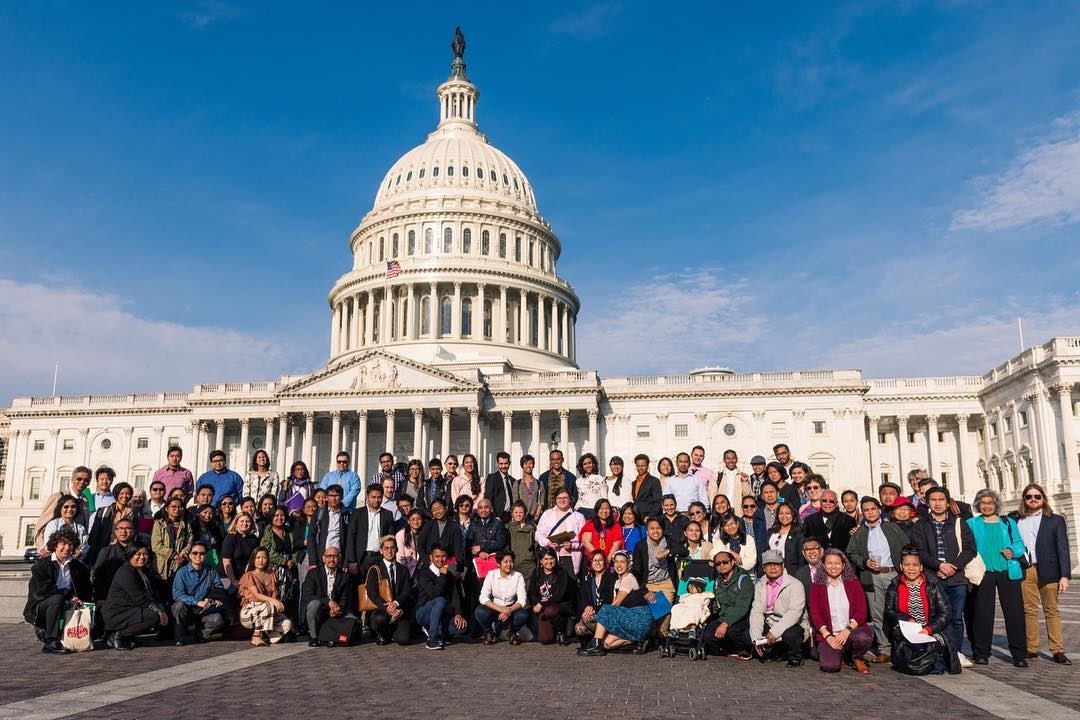
Members of the International Coalition for Human Rights in the Philippines (ICHRP) and Malaya Movement, including several Long Beach community members, in Washington D.C. after garnering support for a congressional hearing on the human rights crisis in the Philippines.
According to the Malaya Movement—a U.S.-based alliance in support of freedom and democracy in the Philippines—under the Anti-Terrorism Act:
“…you can be suspected of terrorism if you commit or have intent to commit (to any degree) acts that cause or create intimidation of the public, promotion of messages of fear, intimidation of the government, destruction or destabilization of the economy, politics, and society, to create public emergency and undermine public safety.”
This includes, “speeches, proclamations, writings, emblems, banners or other representations of the same.”
By this definition, simply attending a public protest or posting a meme can be interpreted as “terrorism” by the government at their discretion. Effectively, this law nullifies the basic democratic rights of anyone who is critical of the Duterte administration and whom Duterte can detain on the basis of mere suspicion.
Before passing the Anti-Terrorism Act, Duterte had already become subject to strong criticism among the international community for the 30,000 extrajudicial killings of Filipinos—many of whom are poor farmers or peasants, Indigenous people, journalists, teachers, lawyers, priests, and other human rights leaders.
Since the pandemic began, Duterte has used the crisis to justify more military presence on the streets, leading to the mass arrests of 35,000 Filipinos, instead of providing mass testing and other forms of assistance. He even managed to escalate his attacks on press freedom by shutting down the country’s largest media company, ABS-CBN, in retaliation for broadcasting news reports critical of his administration. In fact, Duterte’s attack on press freedom hit home in 2018 when two Long Beach filmmakers were beaten and detained by Philippine state forces while they were documenting the NutriAsia worker’s strike.
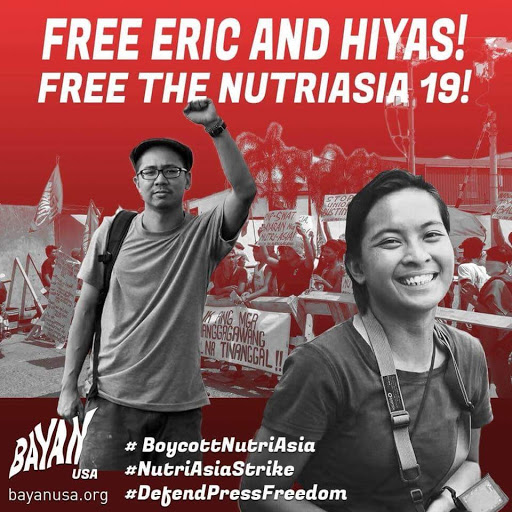
Local filmmakers Hiyas Saturay and Eric Tandoc were in Bulacan, Philippines covering the NutriAsia strike when they were violently taken to jail. Flyer by affiliate organization BAYAN USA.
There are compelling reasons why we should all be alarmed by the Anti-Terrorism Act and its implications here. First, the Anti-Terrorism Act applies to overseas Filipino citizens, including Filipinos with dual citizenship in the U.S. and Philippines. With the recent expansion of Philippine state forces in Los Angeles under the guise of the Philippine National Police Community Relations Group, local community members and organizations worry about local surveillance of Filipinos and Filipino-Americans by the Duterte administration.
Secondly, there are concerning parallels between government spending on police and military in the U.S. and in the Philippines. For example, Long Beach’s Fiscal Year 2020 budget allotted $265 million to the Long Beach Police Department (LBPD), but only $3.4 million to the Health and Human Services Department, the latter being forced to rely on state and federal grants which are potentially unstable. This means that on average since 2014, Long Beach has spent at least $2 million per year more than the entire budget of the Health and Human Services Department Budget in settlements, verdicts, and legal fees for police misconduct lawsuits.
Tomisin Oluwole
Coquette
Acrylic on canvas
18 x 24 inches
Click here to check out our interview with Tomisin Oluwole, a a literary and visual artist based in Long Beach.

Instead of gunking up our site with ads, we use this space to display and promote the work of local artists.
This disparity mirrors U.S. monetary aid to the Philippines. In 2018 alone, the U.S. government provided $193.5 million of tax dollars to the Philippine military and police, whereas it only provided $35.5 million in basic health services. This $193.5 million is just a fraction of the $550 million total in U.S. monetary aid since Duterte took office in 2016, and separate from the recent $2 billion in arms sales between the two countries. As U.S. aid to the Philippine military and police has increased over the years, so have the extrajudicial killings of Filipinos, harassment of activists and human rights leaders, and militarization of poor and Indigenous communities.
It is clear that the Trump administration has played an enabling role in the human rights crisis under Duterte, and the conditions in Philippines should be seen as a warning for the escalating state violence we’ve seen in our country, like the state terror in response to mass protests against police brutality. With the recent violence against protestors by Gestapo-like federal agents in Portland, the bleak targeting of and violence against anyone standing firm in the pursuance of justice is a near reality for American citizens.
So, how has the Filipino community responded to the Anti-Terrorism Act and Duterte’s fascist leadership? In the Philippines and internationally, there are hundreds of grassroots organizations fighting for national liberation and genuine democracy in the Philippines. Many of these organizations are composed of activists, students, youth, clergy, educators, lawyers, and Indigenous communities that have found collective action to be the only option in resisting the mass killings and exploitation of the Filipino people and their land’s resources. Many experienced leaders of these organizations have lived through fascist dictatorship before, such as the 1972-86 era of the Ferdinand Marcos regime.
There were similar attacks on activists at that time; however, even those cruelties pale in comparison to the abuse and violence we are currently seeing enforced by Duterte and his state security forces, the Philippine National Police (PNP) and the Armed Forces of the Philippines (AFP).
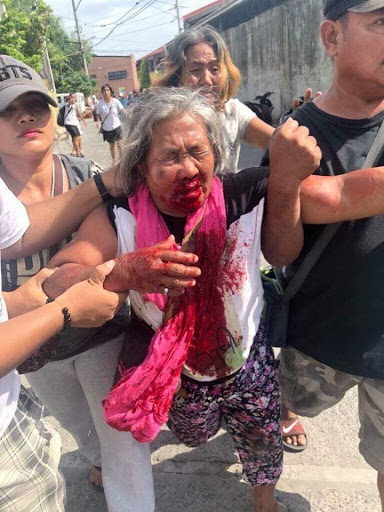
Graphic images of an elderly woman covered in her own blood at the hands of the Philippines police during their violent dispersal of the NutriAsia picket line went viral and brought international condemnation. Marilao, Bulacan, Philippines. Photo credited to Anakbayan-Bulacan State University. Photo shared by Altermidya, a national network of independent media sources.
The difference in the people’s resistance then and now? Numbers. The people’s movement for liberation is spreading like wildfire worldwide and it is a flame that cannot be put out. The mass organizations that were born out of the Philippine struggle for liberation are now expanding with new chapters across the U.S. and internationally. With the number of Filipino Americans becoming more aware of the human rights violations happening in their motherland, there is simultaneously a growing number of non-Filipino allies becoming informed as well. Now in the wake of a people’s uprising here in the U.S., we have a larger population looking to what can actually be achieved when people get ‘organized’.
As members of the Philippine-U.S. Solidarity Organization of Southern California (PUSO SoCal), we organize to support the people of the Philippines in their fight for national liberation and genuine democracy, as well as strengthen the ties of resistance and solidarity here in the United States. PUSO SoCal functions in tandem with a much broader solidarity coalition known as the International Coalition for Human Rights in the Philippines (ICHRP), formally established in 2013. We recognize that as citizens of the U.S. we are in a unique position to speak out against the horrors of Duterte’s regime without the same fear of retaliation, unlawful arrest, or in the worst case, murder. As constituents, it is our right and responsibility to inform our elected officials about how their actions or lack thereof affect our communities and families abroad.
In 2008, several Philippine grassroots organizations met with Sen. Barbara Boxer, then chairperson of the Subcommittee on East Asian and Pacific Affairs, to discuss the human rights violations committed by President Gloria Macapagal Arroyo. In these discussions, Boxer agreed to host a congressional hearing concerning the tax-funded aid and was successful in securing a halt of it until certain human rights conditions were met. This is again the current strategy for organizers of PUSO SoCal, ICHRP, Malaya Movement, and our other affiliate organizations.
Long Beach’s very own Rep. Alan Lowenthal (CA-47) has been supportive of our campaign to halt U.S. aid to the Philippines. Just recently he and 49 other U.S. legislators signed a letter drafted by Rep. Jan Schakowsky (IL-9) to Philippine-U.S Ambassador Jose Manuel Romualdez, formally asking the Philippine government to immediately repeal the Anti-Terrorism Act. Among the 50 legislators that signed, Rep. Judy Chu (CA-27) stated that the letter was a “first step” in addressing the human rights violations of the new law. Chu also commented on the law’s title, exposing it to be not about terrorism but rather “silencing dissent.”
While we celebrate this recent display of support from Congress, we are hopeful for their continued advocacy as we work to introduce the Philippine Human Rights Act. This act would suspend U.S. security assistance to the Philippines until human rights violations by the Armed Forces of the Philippines and the Philippine National Police cease, and responsible state forces are held accountable.
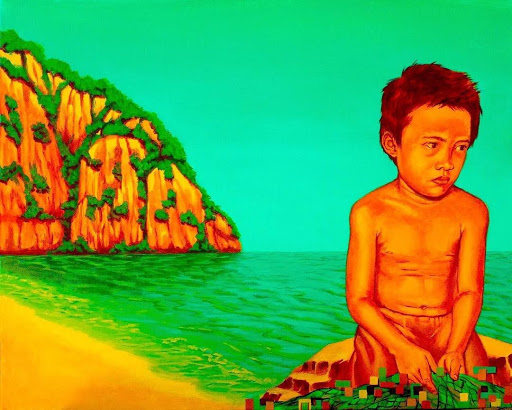
“Life’s A Beach, And Then You Die” by Bodeck Luna.
We urge Lowenthal, as an Executive Committee member of the Tom Lantos Human Rights Commission, to call for a hearing in that Congressional body and investigate the human rights crisis in the Philippines under Duterte. These are actions that can support the work of our affiliate organizations as well as legislators in the Philippines who currently have twenty-two active petitions to repeal the Anti-Terrorism Act circulating in their national Supreme Court.
While the American public faces a peak in state violence in response to recent protests around police brutality and the murder of George Floyd, there is growing international solidarity work among the masses to resist state repression and violence throughout the world. Many nations abroad are all too familiar with the terror of state violence in their countries as well as the unnecessary presence of U.S. forces on their soil. These are commonalities that we cannot dismiss at this time. Black Lives Matter (BLM) co-founder, Patrisse Cullors, published a memoir in response to the accusations of BLM organizers to be “terrorists” from alt-right conservatives and the greater misinformed public. Let us connect these moments in history and be cautious of the rhetoric and misinformation that is intentionally meant to keep the public from understanding and empathizing with the struggles of our own communities in the U.S. and abroad.
Join the fight to resist President Duterte’s attacks on human rights activists and community leaders in the Philippines! Contact your representative today and help gain support for the Philippine Human Rights Act!

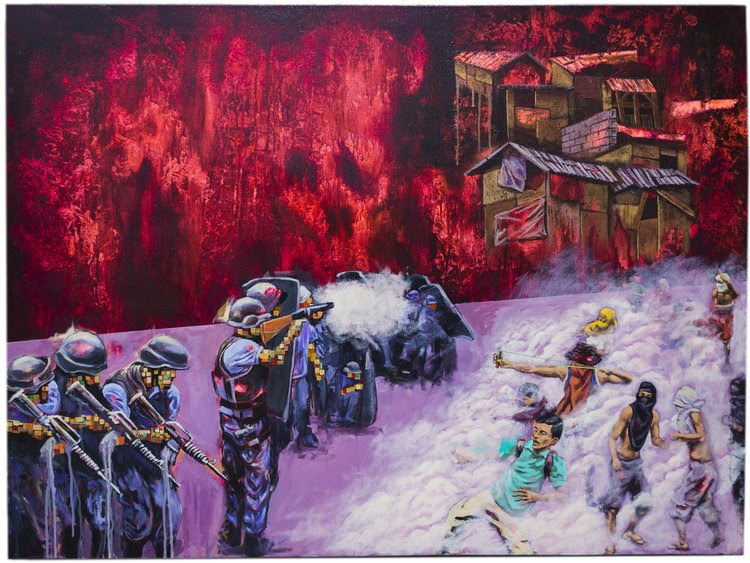
 caliboso.menchie@gmail.com
caliboso.menchie@gmail.com




